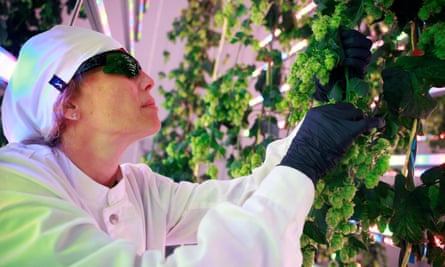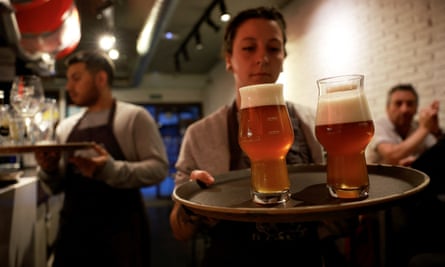Spanish startup on ‘mission to save planet’s beer’ from climate crisis | Beer | The Guardian
Beer
Spanish startup on ‘mission to save planet’s beer’ from climate crisis
Ekonoke’s hydroponic cultivation of hop plants attracting interest of big-name brewers
Sam Jones Though lacking in rustic romance, the disco-lit rows of hops bolting towards the ceiling of an industrial unit just outside Madrid could be the answer to the parched prayers of brewers and beer-drinkers across the planet.
The hop plant, whose bright green flowers have been used for hundreds of years to flavour and stabilise beer, is increasingly falling victim to the climate emergency as hotter summers and unpredictable weather decrease yields and quality.
But Ekonoke, a Spanish startup that has been exploring indoor crop cultivation for the past four years, thinks it has found a viable, and sustainable, solution.
The hops it is growing hydroponically in Alcobendas, and in nearby San Sebastián de los Reyes, are not only yielding as much as their outdoor peers – about 1kg (2.2lb) for each plant – they are also richer in the essential oils and alpha acids that give a beer its all-important bitter taste and aroma.
What is more, Ekonoke’s methods – which remain a closely guarded secret – use 15 times less water than traditional outdoor growing and result in an overall carbon footprint that is 15 times smaller than field growth. And, because the hops are grown indoors under strictly controlled conditions, no pesticides are needed.
Although Ekonoke started out experimenting with leafy greens and micro-herbs, it eventually realised that its niche lay in hops, more than 80% of which are grown in just two countries: the US and Germany.
Ines Sagrario, the company’s co-founder and chief executive, points to a report by researchers in the Czech Republic that analysed the quality and quantity of hops grown in different European countries over a 40-year period.
“They saw that when you had two or more extreme weather events, the impact was huge on both quality and quantity,” she said. “Last year, for example, there was a brutal drought and very, very high summer temperatures. In Germany, where temperatures got up to 35C or 38C, the average hop production per hectare was down by 28%. There were some parts of Germany where they lost 80% of the harvest.” The hops that survived, Sagrario added, were poor quality.
Ekonoke’s hydroponic hops project has attracted the interest of Spanish, and global, beer companies, and is part of an accelerator programme initiated by AB InBev, the world’s largest brewer.
The €4.2m (£3.7m) it secured in investment rounds last year – much of it from the Spanish beer brand Estrella Galicia – has helped Ekonoke build a 1,200 sq metre (12,917 sq metre) pilot factory in the north-west Spanish region that is due to be finished at the end of June. It aims to harvest 5,000kg of hops a year there. Eventually, the company says, it could harvest 90,000kg a year in factories around the world.
Sagrario is grateful for the brewing industry’s interest and support, if not wholly surprised by it: “What the breweries are most interested in is having a guaranteed supply so they can avoid that whole headache of having to see how the year is going and deciding whether to dip into the hop stocks.”
For Ekonoke, however, the technology has far wider implications, especially when it comes to land use and sustainability. Because its methods produce 40 times more hop yield per hectare than outdoor growing, they could free up huge amounts of land for soil regeneration or reforestation.
Given its investment – and the unpredictability of hops yields – the industry is keeping a close eye on the startup and its promise of a guaranteed supply of special varieties. Willy Buholzer, AB InBev’s director for global hops procurement, said the big questions were whether “very promising” indoor farmers could ride out the current high energy costs, and whether they could make headway in a conservative and very well-established sector.
“You should not underestimate traditional [outdoor] hop growers,” he told Reuters. “They always come up with new ideas.”
Ekonoke is also exploring other uses for hops, which is being studied by researchers working on everything from tumours and Crohn’s disease to Alzheimer’s and the menopause. Meanwhile, another company in the same accelerator programme is looking into whether hop vegetable matter can be made into cardboard for six packs of beer.
But beer, unsurprisingly, is never too far from Ekonoke’s thoughts. An IPA has already been brewed using its hops, and the team is investigating how its technology could be used to grow and safeguard different hop varieties.
“One of the things we’re trying to do at the moment is see how far we can recreate the terroir of a specific variety of hops; to see if we can create the right nutritional and climatic conditions so that the hops taste and smell exactly as they would in the region they’re from at a certain time of the season,” said Sagrario.
“But we’ll also be able to recover lost biodiversity by growing varieties that are no longer grown, precisely because they can’t take the changing temperatures or survive diseases that weren’t around before.”
Despite the ever-more inescapable effects of the climate emergency, Sagrario’s glass remains half full.
“Our mission is to save the planet’s beer and I think we’re on the way there,” she said. “We still need to scale up but we have very powerful travel companions.”
Results 1 to 1 of 1
Thread: Hoppy times
-
20-04-2023, 06:15 PM #1
Hoppy times
Thread Information
Users Browsing this Thread
There are currently 1 users browsing this thread. (0 members and 1 guests)














 Reply With Quote
Reply With Quote